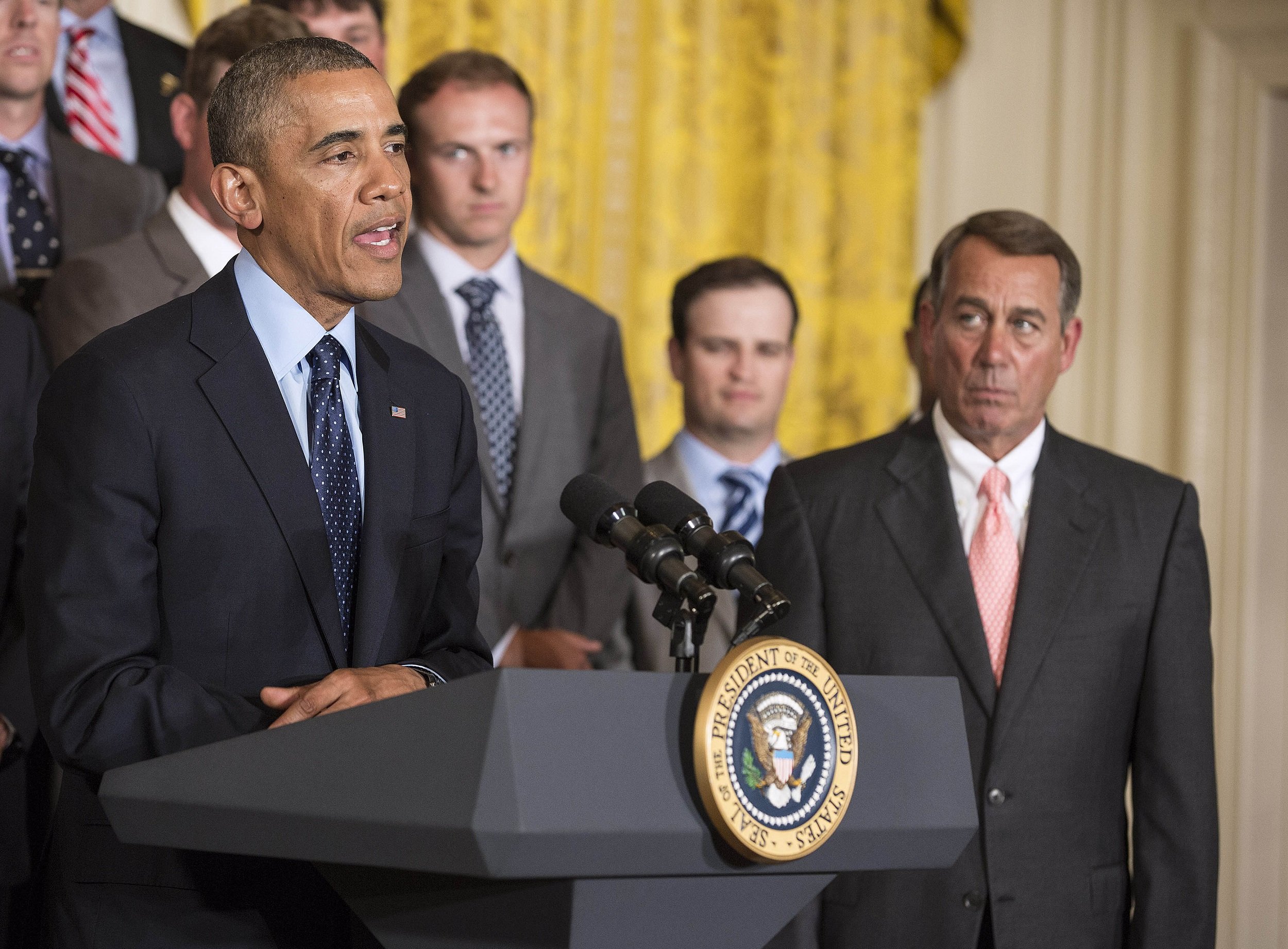
"Executive monarchy," "imperial precedents" and "aggressive unilateralism"—these are just a few of the terms being bandied about since House Speaker John Boehner announced two days ago a grand plan to sue President Barack Obama over his "king-like authority at the expense of the American people and their elected legislators."
Calling Obama's "selective" use of presidential powers "dangerous," Boehner urged House members to join him in challenging the president in a memo issued Wednesday. "If the current president can selectively enforce, change or create laws as he chooses with impunity, without the involvement of the legislative branch, his successors will be able to do the same," Boehner said. "This shifts the balance of power decisively and dangerously in favor of the presidency, giving the president king-like authority at the expense of the American people and their elected legislators."
There's just one problem. Obama has issued fewer executive orders than any other president since Franklin Roosevelt, according to Gerhard Peters, co-founder of the American Presidency Project at the University of California, Santa Barbara. Peters and his co-founder, John Woolley, are among the nation's leading authorities on the use of presidential executive power, going back to George Washington. "In the modern era that most presidential scholars believe began with Franklin Roosevelt in 1933, Obama has issued the least number of executive orders per year," Peters tells Newsweek, after updating and crunching out the numbers.
In fact, Obama's yearly average of 33.58 executive orders is lower than any president in 130 years, going back to Chester Arthur, who averaged 27.7 executive orders a year. (Peters prefers using an average-per-year metric, as the length of presidential terms can greatly vary.)
By comparison, George W. Bush clocked in at 36.38 and Clinton at 45.5. Reagan topped 47 and Carter hit 80, but no president has broken above 100 since Truman, who surpassed 116 and flexed his authoritative muscles to desegregate the Armed Forces with an executive order in 1948, notes Peters, "a much more controversial use of executive orders than anything Obama has so far done."
As of June 20, Obama had issued 182 executive orders, covering everything from financial sanctions on Ukraine and Russia to equal pay for men and women. In the coming weeks, he will sign an executive order prohibiting federal contractors from discriminating against people based on their gender identity and sexual orientation.
Obama has not spoken specifically about his record regarding executive orders—traditionally a way for presidents to use constitutional powers to legislate, imposing anything from legally binding new rules to simple suggestions and recommendations. But he did dismiss the suit as a "stunt." Referring to Boehner in an interview Thursday with ABC News, Obama said, "You notice he didn't specifically say what exactly he was objecting to." Later, referencing members of Congress, he added, "I'm not going to apologize for trying to do something while they're doing nothing."
All of which is not to say presidential overreach is not a real issue. A unanimous decision handed down by the Supreme Court on Thursday—a day after Boehner's lawsuit announcement—found that the president unlawfully made recess appointments to the National Labor Relations Board in 2012. "It has no relation to the president's use of executive orders, but it's germane to the wider debate about whether Obama is overreaching his executive powers," Peters tells Newsweek.
While Peters does not believe the quality or quantity of Obama's executive orders raises any red flags from a historical standpoint, Jonathan Turley, a professor of public interest law at George Washington University, believes a shift toward greater executive power began before Obama and represents a concerning trend. "Even though I voted for President Obama and agree with many of his policies, in my view there is a serious problem here," he told Newsweek. "We've been seeing a shift in our system that certainly didn't start with the president, but the rise of this new type of über-president is destabilizing to our system."
Boehner plans to bring up a proposal in July to authorize the House to use the taxpayer-funded Bipartisan Legal Advisory Group to file suit in the coming weeks.
"It's very weird for the speaker of the House to suggest something like this," says John Hudak, a fellow in governance studies at the Brookings Institution, a think tank in Washington. "That said, if the speaker feels the president has violated the constitutional order of powers in a way that has harmed the House, he may feel he needs to sue."
Peters, Turley and Hudak all noted the federal courts are very wary of handling disputes among the branches of government. "It is not an insurmountable barrier," says Turley, "but it is extremely difficult."
Hudak is skeptical. "While the use of executive power is always an important and healthy discussion to have over any president, my feeling is, this is not being born of a true concern over constitutionality but being born over party politics."
The White House declined to comment, and Boehner's office did not return calls from Newsweek seeking comment.
Uncommon Knowledge
Newsweek is committed to challenging conventional wisdom and finding connections in the search for common ground.
Newsweek is committed to challenging conventional wisdom and finding connections in the search for common ground.
About the writer
An award-winning investigative journalist, author and speaker, Leah McGrath Goodman writes about money, politics and institutional cultures of corruption from ... Read more
To read how Newsweek uses AI as a newsroom tool, Click here.








